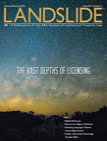 The January/February 2016 issue of Landslide, the magazine of the ABA Section of Intellectual Property Law, contains my article Granting Language in Patent License Agreements: An Analysis of Usages. I recommend the PDF version, here, but there’s also the online version, here. (The PDF provided by Landslide was unsatisfactory, so the PDF is based on my manuscript. The only difference is that the headings contain italics, where appropriate, and the endnotes contain some hyperlinks.)
The January/February 2016 issue of Landslide, the magazine of the ABA Section of Intellectual Property Law, contains my article Granting Language in Patent License Agreements: An Analysis of Usages. I recommend the PDF version, here, but there’s also the online version, here. (The PDF provided by Landslide was unsatisfactory, so the PDF is based on my manuscript. The only difference is that the headings contain italics, where appropriate, and the endnotes contain some hyperlinks.)
As the title suggests, the article discusses an array of words and phrases that you find in patent license agreements. And as usual, I take the opportunity to slay some sacred cows.
I think I’ve established some IP cred in recent months, what with this article and the one on use of the phrase inures to the benefit in trademark license agreements (here). I’m essentially a stranger to intellectual-property law, but in writing these articles I applied the approach I bring to bear in all my writing: I check what’s used in contracts, review all relevant subject-matter literature, bring to bear some semantic acuity, and hey presto. I can do the same for any contract language, no matter how specialized.
Writing these articles reminded me of how, in the waning days of my law-firm existence, I attended a lunchtime presentation on drafting IP contracts. The speaker was an IP partner, and he ended up offering an idiosyncratic take on some mainstream drafting notions. IP guys, you are not an island: it’s best to base your contract usages on general guidelines for clear and modern contract prose.
[Updated 4 February 2016: Go here to read Mark Anderson’s thoughts on my article.
By the way, I’m under no illusion that I, an IP interloper, have somehow set the IP world straight. An article like this might seem a definitive statement, but it’s more a starting point. The more input from the likes of Mark, the better.]

A few thoughts on your article:
1. The statement of the Federal Circuit you refer to as supporting the theory that a patent only grants a right to sue rather than any affirmative right is, I believe, controversial, so I wouldn’t put a lot of weight on it. It comes about because unlike the Copyright Act, the Patent Act doesn’t offer a list of affirmative rights of a patentee. Thus, the statement, to the extent it may be true under the Patent Act, doesn’t help a drafter in mixed licenses or pure copyright ones (I haven’t checked the Lanham Act, and in any case trademark is covered by a welter of federal and state law so its conceptual framework isn’t so easy to ascertain).
2. The notion of “worldwide” license is, as you say, problematic insofar as a patent is only issued by one sovereign at a time, but can be protected *internationally* through applicable treaties; but it can have significance (paradoxically in view of my comment above) if it is interpreted as meaning that the licensor won’t sue the licensee if it practices the patent anywhere in the world. However, you have to exercise caution here, because a license may contain indemnification obligations, and a licensor wouldn’t want have those obligations everywhere in the world.
3. I’m still troubled by the idea that conditions to a grant should be omitted from the granting clause (e.g. “subject to…”). It would be necessary, I think, to state explicitly somewhere in the agreement that if the licensee violates certain obligations, not only can the licensor sue for breach of the agreement, but the licensee loses its license rights and can be sued for infringement. The Patent Act does explicitly state that a patent is in the nature of personal property; if I sell you my car and you don’t pay for it, or your check bounces, I might not only want a claim for damages but I might want to get my car back and make you liable for conversion.
Thanks; I’ll ponder. It was rash of me not to show you the manuscript!
Ken, I’m not an IP specialist either, so may be off-base on this, but I was taught that there could be a useful distinction between granting a license and an immunity from suit. The theory is that an immunity is analogous to a quitclaim deed — “whether or not I have any IP rights, I won’t sue you,” while a license implies that the licensor in fact has something to license.